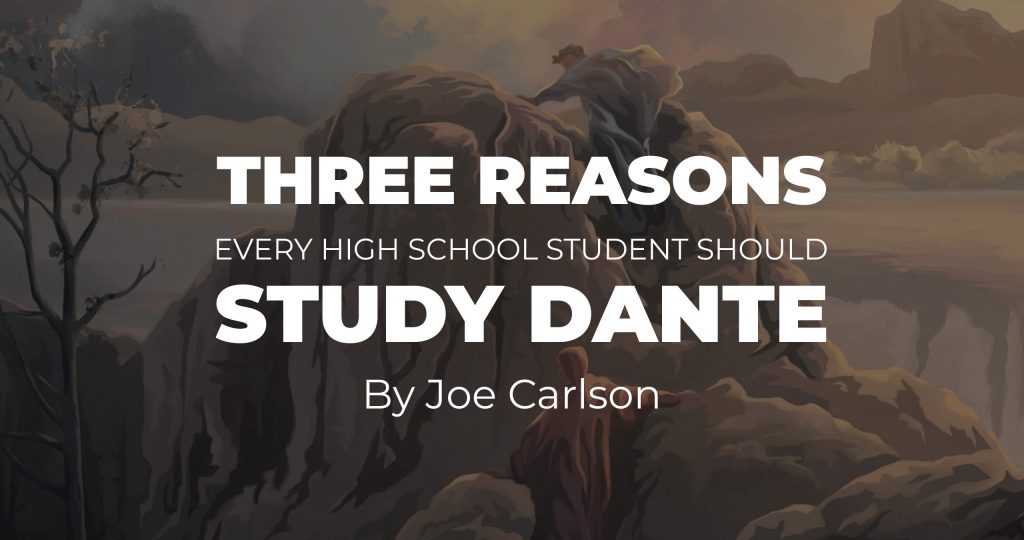Three Reasons Every High School Student Should Study Dante

I want to make the case that every high school student should read and study Dante’s Comedy. More specifically, I want to argue that every protestant, reformed, and evangelical high school student should read and study Dante. Everyone should read Dante, so why do I get so specific? Because Dante was upstream of the Protestant Reformation. He was born before Luther and Calvin, and predates the Protestant Reformation. Because of this, he is often unjustly condemned to the wrinkled brows of skepticism and wariness. Dante published the Comedy almost 200 years before Luther posted his 95 theses, and 230 years before the first edition of Calvin’s Institutes were published. This means he belongs to the shared heritage of both Catholics and Protestants, like Augustine and Anselm. Evangelicals should look on Dante as the crazy but brilliant uncle still invited to all the family get-togethers, despite some disagreements. We spend time with that uncle because he is family, and we love him. And wouldn’t you know it, but the better we get to know him, we find that we actually agree more often than we disagree. Besides, he really is brilliant, and we love hearing him talk.
That is Dante. We might disagree about the reality of Purgatory as a physical intermediate state or the veneration of Mary, but there is far more to the Comedy than these doctrines. For those Christians who take the time to read and study what I believe to be the greatest epic poem of all time, Christian or otherwise, they will find much to be blessed by. He really is a brilliant poet, but also the crazy uncle we need in these crazy times.
Getting down to brass tacks, here are three reasons why our high school students especially should get to know the Comedy.
1 – The Comedy as CPR for our Impoverished Imaginations
Our modern secular world has thoroughly impoverished our imaginations. We have been trained to look at the world like a butterfly collector looks at his collection, pinned on a board behind glass with little tags underneath. We do not see the world as a living thing, alive with the truth, beauty, and goodness of God. Dante writes his poem with the governing assumption that the whole cosmos is the majesty and light of God’s glory made alive. The world itself is Christ-shaped, the living words of the Living Word, formed through Him, by Him, and for Him. Jesus is not just the Savior and Redeemer of His people. He is not just the King of kings and Lord of lords. He is the living breath of the universe. Every particle and every galaxy exists because of Him, and declares His preeminence. This is a vision of creation that our students today sorely need, inundated as they are on every side by the soul-sucking, meaningless myth of evolution. But Christians who roundly reject that theory in favor of what Genesis says, still fall prey to the modern mindset that raises a thick brick wall between physical and spiritual things. Our lives often betray the fact that we think God is only relevant to our inner person, and not our physical endeavors. Sunday is for spiritual things, Monday through Saturday for earthly things, and never the twain shall meet. Dante’s Comedy, by contrast, pictures a Sunday through Saturday creation, reverberating deeply at every moment with spiritual meaning and spiritual reality. He presents us with a world at home in both the transcendence and immanence of God. In his paradigm-shaking poem, Dante will build up in our students a rightly ordered imagination, that faculty that sees creation and processes those images, equipping them with the power to look through the material world and see the Personality behind it.
2 – The Comedy as Wisdom for Social Media Knuckleheads
Social media has thoroughly destroyed our sense of community. We count ourselves blessed to have hundreds if not thousands of friends, 99% of whom we have never looked in the eye, or shared a piece of the sky with, or actually heard laugh. The internet age in which we live has trained the new generation, who has never lived in a time when google was not a couple taps away, to think of themselves as their own arbiters of information and knowledge, giving them a false sense of wisdom. We think that because we can look something up for ourselves, or have an AI powered chatbot report back to us about a certain subject, we have actually gained knowledge. But that is not what knowledge is. True knowledge is more than data and facts. True knowledge, leading to true wisdom, can only be found within a community of real, flesh-and-blood people, with whom we share meals and birthdays and moments of profound grief. Knowledge is more than bytes; it is the offspring of real-world experiences of community, picked up by witnessing the lives of those who are a few steps ahead of us on this path. Dante’s Comedy reveals, in gripping detail, how sin destroys this community, turning individuals into small pebbles that shun other pebbles, distrusting their very presence. But more than that, it shows how sanctification and holiness are only possible in the context of other people sharing the same physical space as us, and it gives us a taste of what a glorified communion of saints might look like. It is a picture that will make students hunger for real people, real connections, real community, and real wisdom.
3 – The Comedy as Sanity in an Insane World
Expressive individualism has thoroughly defined, and destroyed, our culture today. Students are being taught everywhere, from advertisements to TV shows and movies to all the twists and perversions of clown world, to believe that who they are depends entirely on who they want to be. Their own vision of their own identity is held up as an inalienable right and an undeniable law. However they wish to identify, whether as a girl or a boy or as a fish or a houseplant, their proclaimed identity must be honored and celebrated. That is the culture they are growing up in. Not only does Dante show the consequences of this rebellion against nature, he also offers a bracing counter-narrative to its insanity. The Inferno shows in graphic images what “expressive individualism” actually looks like, and what it does to the human soul. That worldview is literally a Hell-hole, and students of the Comedy will come face to face with where it leads. But more than a spot-on diagnostic, the Comedy also presents an alternative way of living, one that moves with the grain of creational realities. We were created to love the good, to pursue the good, and to rest in the good. And that only happens when we see the good as originating not in our own wills, but in the person of Christ. We were made for Him, and not for ourselves, to worship Him, and not our own notions of self. Our identity is in Him, no matter what we may say to the contrary, for He made us in His image. The journey of the pilgrim, and the journey of the student with him, is the journey from the dark wood of ignorance, rebellion, and fear to the very face of Jesus, in Whom we are made whole and complete, in Whose will is our peace. The student of the Comedy will walk with the pilgrim as his mind, will and appetites are made whole and free through repentance and faith in the Lord Jesus Christ, through the sanctifying work of the Spirit, and through the persistent love of the Father, Who orders all things for the pilgrim’s good.
Further Reasons to Read Dante
There are many other reasons to read Dante: the supreme beauty of his poetry, his epic vision of the cosmos, the exciting structure of the medieval universe, his encyclopedic knowledge of mythology and history, his extensive and masterful use of Scripture, his poignant and profound commentary on the social issues of his time (which, funny enough, turn out to be the same things we are dealing with today). But the three reasons I have listed here are some of the more important reasons for us in these crazy times. We need imaginations that are sensitive to the allusive power of creation, enabling us to see the beauty and glory of Christ wherever we look. We need a restoration of true community in which we experience life together with a cadre of real people, from different generations with whom we can break bread and laugh and work. We need to look outside of ourselves for our own meaning and identity, and be given tangible truths with which we can fight back against the insanity of our broken world. Our young men and women especially need this vision, by which their loyalties and affections can be properly given to Jesus. They need a vision of beauty and truth and goodness that will sink down into their bones, and shape their understanding of the world, a vision only poetry can give. And when it comes to the world of great literature, there is no better place to start than with Dante. He is the crazy uncle we need in these crazy times.
More from Joe Carlson
- More Articles by Joe Carlson
- Dante’s Divine Comedy – a new translation, with reader guides by Joe Carlson
- Kepler Class this coming Fall for High Schoolers
- Kepler Class this coming Fall for Parents and Teachers

Joe Carlson (MA Humanities) lives in the DFW metroplex with his wife and son. He received his BA from New St Andrews College, and his MA from the University of Dallas, where he is currently completing his doctoral studies. His thesis explored and unpacked a specifically doxological pedagogy, based on Dante’s educational projects. He has managed a chain of coffee shops, published (micro) epic poetry, co-pastored a church, helped create and staff a university campus ministry, written for the Salvo Magazine blog, and taught many different kinds of classes over the years. It was a passion for the medieval cosmology enjoyed by C.S. Lewis that eventually brought him back to an ever deepening love for the Divine Comedy.